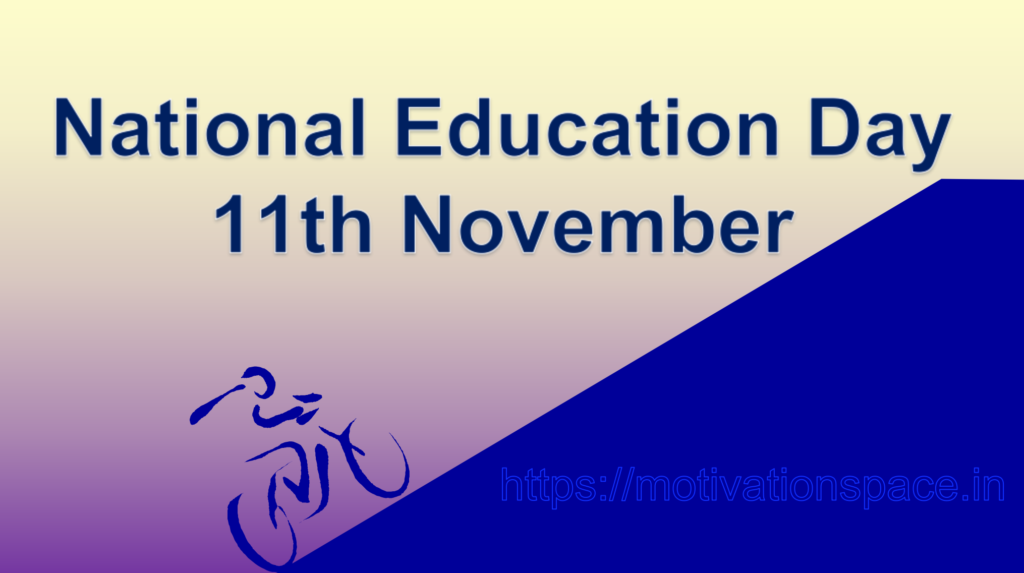Contents of this article
National Education Day: Celebrating Knowledge, Empowering Futures. On November 11th, India observes National Education Day, a commemoration of the birth anniversary of one of its most esteemed leaders, Maulana Abul Kalam Azad. This day is dedicated to celebrating the invaluable role of education in shaping the future of a nation and empowering its citizens. Maulana Abul Kalam Azad, a visionary and the country’s first Minister of Education, is known for his tireless efforts to promote education and build a strong foundation for the intellectual and moral growth of India. In this article, we delve into the history, significance, and contemporary relevance of National Education Day.
The Legacy of Maulana Abul Kalam Azad
Maulana Abul Kalam Azad, born on November 11, 1888, was a prominent freedom fighter, scholar, and leader of the Indian National Congress. His contributions to the Indian freedom struggle were significant, but perhaps his most enduring legacy is his unwavering commitment to education.
Azad firmly believed that education was the key to individual and national development. His vision was not merely about imparting knowledge but also nurturing a generation of young minds with a sense of moral and ethical values. He argued that true education should promote not just the accumulation of information but also the development of a holistic personality and character.
Azad’s remarkable life and work have left a profound impact on India’s education system. In recognition of his contributions, National Education Day was established in 2008 to celebrate his birth anniversary and honor his vision of education as a tool for empowerment, progress, and social transformation.
The Significance of National Education Day
National Education Day holds immense significance for India and its citizens. Here are some key aspects of its importance:
Tribute to Maulana Abul Kalam Azad:
National Education Day serves as a tribute to the memory and legacy of Maulana Abul Kalam Azad. It is an occasion to remember his vision, his dedication to education, and his invaluable contributions to the nation.
Educational Reforms:
The day encourages discussions and initiatives related to educational reform and improvement. It provides a platform to address challenges in the education system and work towards its enhancement.
Advocacy for Literacy:
National Education Day promotes literacy and access to education, particularly among marginalized and underserved populations. It underscores the importance of education as a fundamental right for all.
Moral and Ethical Values:
Emphasizing moral and ethical values in education aligns with Azad’s vision. It highlights the importance of character-building in addition to academic knowledge.
Empowerment and Social Transformation:
Education is a powerful tool for individual empowerment and social transformation. It equips individuals with the skills and knowledge necessary to lead meaningful and productive lives.
Access to Quality Education:
The day calls for efforts to ensure that all citizens, regardless of their background or socio-economic status, have access to quality education.
Encouraging Lifelong Learning:
National Education Day encourages a culture of lifelong learning, where individuals continue to acquire knowledge and skills throughout their lives.
Educational Initiatives and Reforms
National Education Day provides an opportunity to reflect on the state of education in India and launch or support educational initiatives. Here are some key areas of focus for educational reforms and development:
Access to Quality Education:
Expanding access to quality education, particularly in rural and remote areas, is a priority. Initiatives like Sarva Shiksha Abhiyan and Rashtriya Madhyamik Shiksha Abhiyan aim to provide free and compulsory education to all children up to the age of 14.
Digital Education:
The COVID-19 pandemic has accelerated the adoption of digital education. Ensuring equitable access to online learning resources and technology is crucial.
Curriculum Development:
Regular updates to the curriculum to reflect modern needs, values, and skills are essential. Focus areas may include critical thinking, problem-solving, and digital literacy.
Teacher Training and Development:
Well-trained and motivated teachers are essential for a high-quality education system. Investment in teacher training and professional development is vital.
Inclusivity:
Educational reforms should focus on inclusivity, ensuring that children with disabilities, girls, and children from marginalized communities have equal access to education.
Vocational Education:
Promoting vocational and skill-based education is essential for preparing students for the job market and enhancing employability.
Research and Innovation:
Encouraging research and innovation in education can lead to the development of effective teaching methods, technologies, and strategies.
Challenges in the Indian Education System
While National Education Day serves as a reminder of the importance of education, India’s education system faces several challenges:
Quality Disparities:
Disparities in the quality of education are evident across different states and regions. Addressing these disparities is a significant challenge.
Access to Higher Education:
Access to higher education, particularly in prestigious institutions, can be limited by factors like entrance exams and economic barriers.
Teacher Shortages:
There is a shortage of qualified teachers in many areas, impacting the quality of education.
Assessment and Evaluation:
The assessment and evaluation system often prioritizes rote learning over critical thinking and problem-solving.
Educational Infrastructure:
Many schools lack basic infrastructure, including classrooms, libraries, and sanitation facilities.
Gender Disparities:
Gender disparities in education still exist, with lower enrollment and retention rates for girls, particularly in rural areas.
Digital Divide:
The digital divide has been exposed by the shift to online learning during the COVID-19 pandemic, highlighting the need for better digital access in education.
Conclusion for National Education Day
National Education Day in India is not just a day of celebration but a day of reflection and action. It is a time to honor the memory of Maulana Abul Kalam Azad and reaffirm our commitment to his vision of education as a means of empowerment, enlightenment, and social transformation. While there are challenges to be addressed in the Indian education system, there is also immense potential for growth and progress. By focusing on equitable access to quality education, inclusive practices, and ongoing innovation, India can work towards a future where education truly empowers its citizens and serves as a beacon of progress and development. National Education Day is a reminder of the role each of us plays in shaping this future. Feel free to contact us for any query related to the contents of this website.


